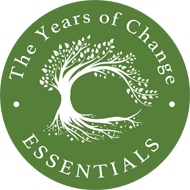
ESSENTIALS 3: STRESS
#3.1 The Stress Response and Managing Stress in Menopause
We are all familiar with the term “adrenaline rush”. The feeling that you would get if you were being chased by a tiger in the jungle or by a grizzly bear in a wood; if you leapt out of an aeroplane; skied a black run really fast;, that feeling as you drop down the rollercoaster!
Podcast Episode available
Any of these activities will trigger the hormone adrenaline to be released from the adrenal glands. You may know this as the ‘fight or flight’ response. Our heart rate rises, pupils dilate, more blood and oxygen is pumped around the body (along with glucose) and is sent to our muscles to allow them to spring into action! We can suddenly find we have “superhuman powers”, we can run faster and feel like if we really needed to we could lift the weight of a car! The body’s ability to feel pain decreases so even if the bear bit your bottom you’d still be able to run away!
But we also produce adrenaline when we are under stress and not in any real danger. The adrenal glands produce several stress hormones including adrenaline and cortisol.
 Cortisol
Cortisol
This is the main stress hormone that is produced alongside adrenaline. Cortisol’s role is also to help regulate blood sugar, metabolism and blood pressure. It also raises sodium levels to keep our blood pressure up. We have many cortisol receptors in our body.
Our cortisol levels fluctuate, rising in the morning to help wake us up and get going and then levels vary during the day. We do need stress hormones to drive us on and to make sure we are reactive to situations, however, if the stress response doesn’t calm down because we are forever in a state of stress (and we may not even realise this!) the hormones are chugging out constantly and this can lead to;
• Weight gain (especially around the middle)
• Poor eating patterns and food choices
• irritability
• lack of concentration or memory
• high blood pressure
• Extreme fatigue
• Depression
• Headaches
• Sleep problems
• Anxiety
• Decreased libido
• Lower immunity
• Cold sores
……and eventually exhaustion as the cycle continues to spiral out of control.
The constant revving of the engine means we have nothing left in the tank and this can also affect thyroid function.
To continue providing this fast energy is likely to result in cravings and increased appetite leading to the risk of weight gain. Insulin and blood sugar levels go on a roller coaster and unless our body is making use of it, extra energy will be stored as fat, PARTICULARLY around the middle of our body and deposited close to our liver for quick conversion to energy.
CAUSES OF ONGOING STRESS AT MIDLIFE
• Work stresses
• Commuting
• Challenging children
• Challenging relationships
• Caring for elderly relatives
• Financial worries
Signs of cortisol imbalance
• Tendency to store fat around middle
• Increased appetite
• Increased cravings for combination of carbs and fats
• Mid-afternoon slump – need coffee / snack to get going
• Low immune system
• Headaches
• Blood Sugar swings
• Problematic digestive system
• Muscle aches and pains / neck & shoulders
• Hair loss
• Difficulty in concentrating
• Depression/feeling blugghhh
• Irregular/absent periods
• Increased PMT
• Slower metabolism
• Tiredness but can’t sleep well
• 2nd wind in the evening; wakeful at night; tired in morning
As we can see, the symptoms we may have can be influenced by different hormones. It can be difficult to determine what is out of kilter! For example, are you suffering with low libido because of a drop in oestrogen? Or is it a drop in testosterone? Or is it because your adrenal glands are fatigued? But it could also be due to Stress? Lack of sleep? Less confidence in your body?
This is another reminder that we need to look at the whole big picture!
If you have any concerns about symptoms that may relate to hormone imbalance do seek help from your medical practitioner.Hormones do fluctuate and alter according to external factors so our best starting point is to check out the big picture first and determine if there are any changes that need to be made.
One thing will affect another - everything is linked in some way and once we restore some balance in our life through optimising our nutrition; managing our stress; having a balanced approach to exercise and addressing our sleep patterns, can we then begin to gain some hormonal balance.